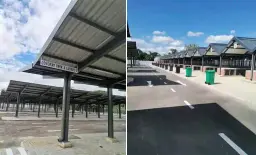The Bulawayo City Council has ordered street vendors to stop trading from undesignated sites by 09 February or be chased away by municipal police.
In a statement, City of Bulawayo Town Clerk Christopher Dube said all informal traders in the city must have a valid Vendors Licence. He said:
All illegal informal traders are warned and advised to move to designated sites no later than February 9, 2024.
Registered informal traders who have abandoned their bays and/or are not paying the requested council fees are advised to return to their bays and regularise their operations.
All informal traders in Bulawayo are required to have a valid Vendors Licence.
As reported kombis (commuter omnibuses) are also being moved back to Egodini after eight years following the completion of the first phase of a project to build a mall.
The mall has 400 vending stalls with 350 more set to be added.
Bulawayo mayor David Coltart estimates 5 000 street vendors are trading in the CBD, a large majority of them illegally.
The council charges monthly rentals of US$11.50 for CBD bays or a one-off annual fee of US$23.
Outside the CBD the charges are US$5.75 per month and a one-off annual fee of US$11.50.
The local authority also warned it clamp down on a wide range of illegal activities, including the washing of cars in the city centre, street vehicle repairs, public transport operators using illegal pick-up points, vehicles delivering farm produce and littering. Added Dube:
The City of Bulawayo will be conducting an exercise to eliminate all illegal activities to restore order and cleanliness.
All informal traders are requested to keep the city clean by ensuring that their trading places are cleared after trading hours and are further advised that the full force of the law will be implemented against those who continue to breach the relevant bylaws both immediately, after the deadline and going forward.
Meanwhile, the City of Bulawayo has advised residents that the transporting of commuters from Egodini shall begin on Monday 5th February 2024.
The high rate of unemployment in Zimbabwe has pushed thousands of people into vending, with most of the traders operating from undesignated places such as pavements in urban areas.
SOURCE : PINDULA









